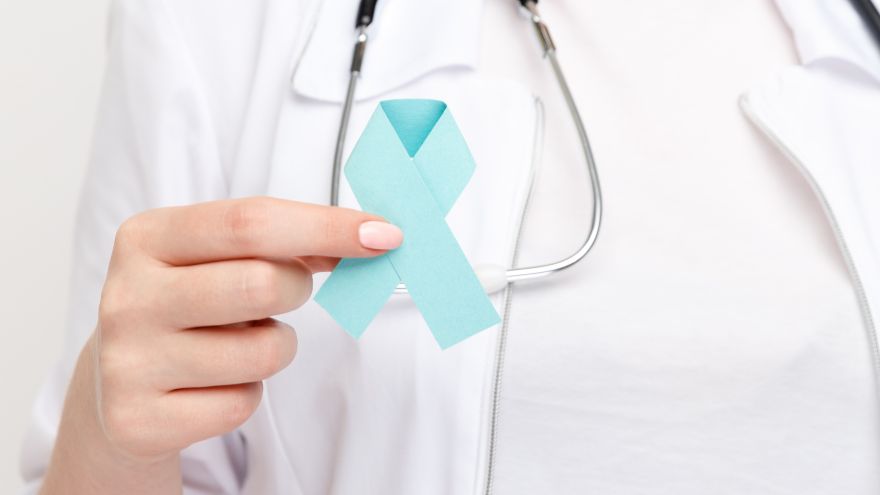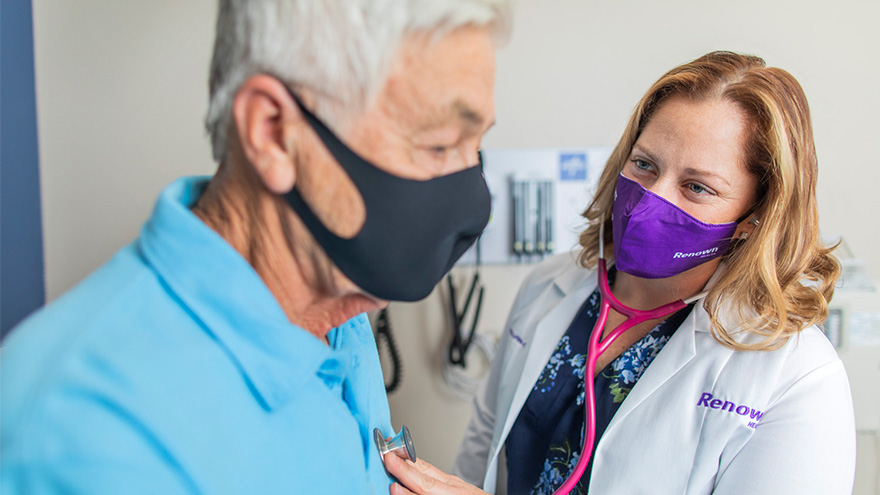Search
-
Perseverance and Physical Therapy Help UNR Student Walk Again
University of Nevada, Reno student Khoa Le was paralyzed in 2010 after a longboarding accident. Through physical therapy, a positive attitude and sheer will, Le is walking again. This weekend, Le will walk across the commencement stage to accept his college diploma. “Walking around on my own power is just the greatest feeling,” says Khoa Le, a senior at the University of Nevada, Reno. Just after finishing summer school at the university in July 2010, his whole life changed within seconds after stepping on a longboard skateboard for the first time. He lost control of the board and hit the curb, causing paralysis on the left side of his body. His journey to recovery began at Renown Health Physical Therapy & Rehab. His physical therapist, Dina Barry, says he never complained once in four years. “I started seeing Khoa in April 2011, and we worked for four years together,” says Barry, a lead physical therapist at Renown. “Everything I’ve ever asked him to do, he does. Le is a hard worker, is continuously optimistic and smiling, and I think that is why he’s accomplished what he has.” Le plans to pursue a career as an information systems manager.
Read More About Perseverance and Physical Therapy Help UNR Student Walk Again
-
Dry Weather and Your Health – What to Know
Dry weather – as northern Nevadans we know it well. Of course this doesn’t mean we’re not affected by its health impact whether you’re new to the area or are a native. Stephanie Stutz, DO, a Renown Medical Group doctor specializing in family medicine, explains how to live comfortably in the high desert. Have you noticed dry skin, itchy eyes or more bloody noses? If you call northern Nevada home, you’re probably no stranger to these problems. “We get a lot of questions from people wanting to know, ‘what can I do to prevent things from happening from the dry weather?’” says Dr. Stutz. “We do have a dry climate, and obviously in the summertime you notice it more than in the winter, so we look at things like dry skin, dry eyes and dry nose.” It generally takes about two weeks to become used to the change in climate. Dry Weather Health Tips Fortunately, there are some easy things you can do to reduce your discomfort in dry weather. Dry skin. “If you have dry skin, use a lotion without perfumes so it won’t increase the potential for drying your skin out,” recommends Dr. Stutz. For example, one home remedy for extremely dry skin (or for those with thinner skin) is cocoa butter. “It’s thicker so it goes under the skin and takes more time to absorb. As a result, you get a much more long-lasting effect.” Dr. Stutz adds. “You can also add lavender essential oil to your cocoa butter to help you sleep at night.” Dry and itchy eyes. “Use eye drops on a regular basis and keep them with you. I recommend people have a couple of bottles – one at home and one in their bag,” Dr. Stutz suggests. Dry nose. “Overall one of the best things to use is a simple nasal wash,” she says. “You can get it over the counter; it’s a saline nasal wash. Use it a couple of times each day and it can be extremely helpful. In particular, gets up into the sinuses and clears them of any pollen or residue in there.” Dry Weather Nosebleed Advice In our dry climate, you may also notice more allergies and nosebleeds. Dr. Stutz cautions, “Surely the dry air can make your allergies much worse. It can create much more irritation, pain and pressure, particularly in the nose and sinuses.” Again, Dr. Stutz recommends using a nasal wash to remove discomfort. Using a nasal wash two to three times a day can also help prevent nosebleeds. “And if you’re someone who has severe or chronic nosebleeds, you can put a little bit of Vaseline along the inside of your nose to create a moisture barrier”. Dry Weather Medication Advice In addition to allergy and nosebleed sufferers, people on certain medications may be at greater risk for symptoms in our dry climate. “The medications you are on can make you much more susceptible to drying out and becoming slightly dehydrated,” Dr. Stutz warns. For this reason discuss all of your medications with your doctor. Specifically, see if you can time them throughout the day or look at changing the dosage. Should I Get a Humidifier? Given our year-round dry weather, you may want to purchase a humidifier to help ease your symptoms. But there are some things you should know first. “You have to be careful with humidifiers as there are pros and cons,” states Dr. Stutz. “The small tabletop humidifiers are not beneficial. You need to get one covering a huge amount of square footage and holding approximately 10 to 30 gallons of water to help your home. On the negative side, if you’re not maintaining it on a regular basis, it will hold on to mold and other allergens. So the next time you turn it on, you’re actually putting that back into the air.” Do I Need to Go to the Doctor? To be sure, it’s important to know yourself and your family. If this is something you experience each year, you can try over-the-counter medications. “But remember, there’s always the caution if you’re on prescription medications,” Dr. Stutz explains. “If you are on chronic prescriptions, come in to get evaluated just to make sure you’re not using anything which interferes with your medications.” Not Just a Summer Problem As the temperatures drop, remember this isn’t just a seasonal issue here in the Reno-Tahoe area. During the winter months, our dry climate combined with cold temperatures and heaters can still cause dry skin, aggravated sinuses and even itchy eyes. So use these helpful dry weather tips all year. Comprehensive Primary Care Renown Medical Group primary care physicians provide comprehensive primary care by appointment. Doctors coordinate each patient’s medical care including checkups, immunizations, referrals to specialists, lab work, X-ray & imaging and hospital admissions. Find a Doctor
-
Low Back Pain – How to Stop the Ache
Low back pain is not only a problem most people have at some point in life, but also the leading cause of disability in the U.S. Whether it is a sharp spasm from lifting something heavy or a daily constant ache, there are various treatments available to relieve your pain. Jessica Ryder PT, DPT, cert VRS, with Renown Health Outpatient Therapy, explains some common causes of this pain, how to treat it and ways to prevent pain flare-ups. It’s important to realize most cases of low back pain are short term. Frequently lasting only a few days or weeks. In general these cases leave no long-term damage to the spine, muscles, discs or nerves. “However, it can become episodic or chronic (lasting longer than 12 weeks) if it is not properly understood or managed by the individual, ” cautions Ryder. Causes of Pain Specifically back discomfort can be related to: Wear and tear on the spine due to age or poor movement patterns Injury to spinal discs Sprains (overstretching or tearing of ligaments) and strains (tears in tendons or muscles) Trauma Irregularities of the spine present at birth (example: scoliosis)Notably the above issues may result in a “pinched nerve” or sciatica, causing pain to extend down the leg. Risk Factors for Pain In particular, your chance of developing low back pain increases with the risk factors below: Age Being overweight Low fitness level or occasional physical activity (“weekend warrior”) Family history Pregnancy Poor posture Jobs requiring heavy physical work (landscaping, plumbers, construction, etc.)
-
What is Disordered Drinking?
An alcohol problem can affect anyone at any age. Many factors, including job stress, genetics or depression, may contribute to the start of disordered drinking. Drinking alcohol exists on a continuum. For example, if someone feels down in the dumps for some time, it doesn’t mean they are clinically depressed. So if someone goes through a period with above-normal alcohol consumption, it doesn’t necessarily mean they abuse alcohol. Although “alcoholic” and “alcoholism” are common, they are not clinical descriptions. Alcohol use disorder is the preferred term. Symptoms are often mild but can be the start of a more significant problem. According to the National Institutes of Health (NIH), over 16 million adults live with alcohol use disorder. Symptoms of Alcohol Use Disorder Do you recognize any of the following symptoms in yourself or someone you know? Drinking more or longer than intended Trying to cut down or stop drinking but not able to Having to drink more than you once did to get the same feeling Being annoyed when family members discuss your drinking Regretting your behavior while you were drinking
-
Learn How to Manage Lymphedema
Katherine Bunker, Physical Therapist and Certified Lymphedema Therapist (PT, DPT, CLT) at Renown, discusses how patients can manage lymphedema with changes to daily routines along with diet and exercise. Lymphedema is a condition that affects millions of people around the world. It is a chronic and progressive disorder that results in swelling of the arms, legs, or other parts of the body due to an accumulation of lymph fluid. Lymphedema can occur because of cancer treatments, surgery, or other medical conditions. Managing Lymphedema Treatments to help reduce symptoms such as pain, swelling and discomfort associated with lymphedema can include compression garments, exercise, skin care, manual lymphatic drainage and pneumatic compression. The goal is to avoid triggering the onset of lymphedema. Lymphedema can present itself immediately after surgery or radiation. It can appear months later or even years later. There are many factors that influence the development of lymphedema which is why prevention is so important. If you have had injury or disruption to your lymphatic system, then: Avoid injuries to the skin near the affected area. For example: wearing gloves during gardening, using bug spray to ward off mosquitos, covering your limbs while playing with pets, keeping nails clean and avoiding cutting too close to cuticle, utilizing electric razors at the armpit (instead of a traditional razor)., Avoid blood pressure readings to the affected limb or request blood pressure to be taken manually, not by a machine. Avoid heat like saunas, hot tubs, sunburns, hot packs, and even massages. Avoid tight jewelry like rings or bracelets, which can be too tight.
-
Why are Annual Exams & Routine Screenings Important?
March is Colorectal Cancer Awareness Month, and we want you to receive the best preventative care possible. Early detection can help prevent serious illness, yet many people still choose to skip their annual exams and routine screenings. Bonnie Ferrara, MD, MPH, Section Chief for Primary Care at Renown Medical Group, further explains the importance of this simple, easy way to stay healthy. Why are annual exams so important? The benefits of early detection and prevention to save lives and reduce the impacts of disease have been proven. These exams are the perfect opportunity to get your health questions answered. “This is your chance to sit down with your provider and talk about your overall health and your family’s health history as well as your concerns for the future,” says Bonnie Ferrara, M.D., family medicine. “It’s the opportunity for your provider to talk with you about your lifestyle, tobacco use, exercise and alcohol use, all of which make a difference in your future longevity.” The annual wellness exam is also an ideal time for most adult patients to discuss health screenings. In addition, these visits are the perfect time to address issues that may not directly relate to a particular medical problem or immediate illness. A good rule of thumb is to schedule these appointments around your birthday each year to make sure you and your provider are both updated on your care. Why would you need an annual exam if you aren’t feeling sick? According to Dr. Ferrara, seeing your care provider when you aren’t sick is one of the best times. “It is better if you try to arrange this visit when you are not feeling ill,” she says. “It is an opportunity to talk about wellness. Not only how to contribute to your wellness but also the changes that you can make that will make huge dividends in the future for your wellness. In addition, it allows us to do some education about what to expect in the coming years as far as your health and lifestyle changes.” What can you expect at an annual exam? Annual exams usually check your: History – lifestyle behaviors, health concerns, vaccination status, family medical history Vitals – blood pressure, heart rate, respiration rate and temperature General appearance – your care provider can find out a lot about you just by watching and talking to you Dr. Ferrara adds, “If this is a Medicare annual wellness exam, it is an opportunity to talk to your provider about depression and dementia as well as be tested for those.” You can also leverage your annual exam to speak to your provider about managing your chronic health problems. "As a provider, these visits give us the opportunity to hear how the medications and lifestyle changes we have recommended are working and if you are having problems with these, we have the opportunity to make suggestions of how to do things better for the future," Dr. Ferrara.
Read More About Why are Annual Exams & Routine Screenings Important?
-
Six Tips for Healthy Vision
You might think worsening eyesight is inevitable as you age. But the truth is, there are easy things you can do to keep your eyes in tiptop shape for years to come. Clear vision is an essential part of overall health and there are daily habits we can adopt to keep our eyes seeing clearly. Mitchell Strominger, M.D., a registered ophthalmologist with Renown Health specializing in pediatric ophthalmology and neuro-ophthalmology, offers some everyday tips to keep you focused on eye health. Know your family’s vision history Look to your parents and grandparents for clues about the future of your eye health. Were they near-sighted at a young age? Do they have a history of eye crossing or a lazy eye? Did they develop glaucoma or macular degeneration (AMD)? Some genes have a strong association with eye health, specifically macular degeneration. AMD is a leading cause of blindness worldwide and the top cause of vision loss and blindness for Americans over 65, according to the Centers for Disease Control and Prevention (CDC). Also be aware certain medical conditions, such as diabetes, high blood pressure and liver disease, increase the risk of long-term eye problems. Receive regular vision screening exams Children under three need vision screening examinations by their pediatrician. A medical concern or family history warrants a comprehensive eye examination by a pediatric ophthalmologist (or general ophthalmologist or optometrist who has experience with children) per the American Academy of Ophthalmology (AAO). Vision screenings should occur every two years throughout adolescence unless pain, eye crossing, difficulty seeing the board or reading, or other eye concerns occur. In adulthood the risk of eye problems increases over age 40, so the AAO recommends regular dilated exams. When your pupils are dilated it allows your eye care professional a more accurate view of your retina and optic nerve, located in the back of your eye. This allows them to look for AMD or other eye problems. Eye diseases can be caught at their earliest stages during a dilated eye exam. “It is especially important to have your child evaluated as soon as possible if there is any concern for eye crossing or lazy eye,” says Dr. Strominger. “The visual system develops in the early years so intervention, whether it be glasses, eye patching to strengthen the vision in one eye, or eye muscle surgery is critical. Children at risk include those who are born premature, have development abnormalities, genetic disorders such as Downs syndrome, or a strong family history and should be evaluated at a young age. Often small problems are not clearly evident and cannot be picked up on routine screening examinations in the pediatrician’s office.” Block the sun, improve your vision Everyone knows not to stare directly into the sun, but indirect ultraviolet (UV) sun rays can cause serious harm over time. According to the National Eye Institute, sunglasses (or a protective UV tint) are a daily must to protect your eyes from: Cataracts (a clouding of the eye’s lens causing blurred vision) AMD - macular degeneration Pterygium (a tissue growth over the white surface of the eye that can cause astigmatism) Look for sunglasses which block 99 to 100 percent of both UVA and UVB rays. You still need sunglasses if your contact lenses block UV rays. Sun rays can damage your eyelids and other tissue not covered by contact lenses. Wearing sunglasses protects your entire eye area. Eat colorful meals Your eyes need vital nutrients to keep them healthy including vitamin C, zinc, beta carotene and copper. A diet filled with citrus fruits and a variety of vegetables provide these essential nutrients. Regularly filling up on fish high in omega-3 fatty acids (salmon, tuna, sardines) may reduce your risk of AMD and help maintain your eye health. Green, leafy vegetables (kale, spinach, collard greens) containing lutein and zeaxanthin are also a must for your dinner plate. Water your eyes Eyes, like the rest of your body, need plenty of water to prevent dehydration. Make sure you stay hydrated and steer clear of smoke to avoid dry eyes and irritation. Hours staring at the computer screen can also make your eyes feel dry or tired. Try regularly refreshing them with lubricating eye drops. Taking frequent computer breaks is also important. Follow the 20/20/20 rule: every 20 minutes, look at an object 20 feet away from you for 20 seconds. Eye makeup can also lead to dry eye as the glands at the base of the eyelashes may become clogged, causing dry eye. Make sure all eye makeup is hypoallergenic and is thoroughly removed with a gentle cleanser for the delicate eye area each day. Stop Smoking (or never start) Smoking is harmful to every part of your body, including your eyes. It's not only linked to cancer and heart disease but also cataracts, AMD, dry eye, optic nerve problems and many other problems. Smoking during pregnancy can also harm the eyes of the unborn child. If you currently smoke take steps to quit and your entire body will benefit.
-
Supporting LGBTQ+ Community Health – Why it Matters
Renown Health has long supported northern Nevada’s LGBTQ+ community Pride events with sponsorship, and we’ve collaborated with local and regional LGBTQ+ organizations as an ally. Renown’s Pride Committee works to deepen and broaden our external and internal efforts around LGBTQ+ community engagement, advocacy, and healthcare issues related to sexual and gender minorities, which is part of the greater Diversity, Equity and Inclusion efforts Renown is undertaking. According to Harvard Chan School, data shows that nearly a sixth of LGBTQ+ adults feel they were discriminated against based on their sexual orientation and gender identity. As a result, this brings to light the important need for education within the healthcare setting. Renown Health is bridging the gap for our LGBTQ+ population, and we know more work needs to take place in order to become an inclusive organization. Below are a few ways we’re working on improving our response to LGBTQ+ needs, and celebrate, respect and honor our diversity by being inclusive. Diversity, Equity and Inclusion The Diversity, Equity and Inclusion subcommittee was formed to heighten the awareness and develop a plan on how to better serve all of our diverse populations, including our LGBTQ+ patients. As the largest healthcare provider in northern Nevada, we knew that we could do a better job. The subcommittee provides us a forum to discuss ideas and develop plans to provide better care to these populations. Updated Medical Records with Preferred Name and Pronouns Of course healthcare is personal. We meet patients at their most vulnerable states. And relating to every person by the correct pronoun shows we respect their gender identity. A new medical records update supports our doctors, nurses and care team in capturing this vital information. We are now able to capture every person’s preferred name, sex and sexual orientation to better care for them. Kathleen Zaski BSN, RN, Manager of Clinical Informatics and IT Applications at Renown explains why this is so important. “Your name and identity are core to who you are as a person, and here at Renown, we aim to take care of you as a whole person and to provide the highest level of quality care to our community – all while ensuring the experience is exceptional and tailored to the individual. In other words, having the patient’s preferred name and pronoun in the medical record is important to validate their identity, and show we care, in an already high stress environment. Specifically, giving our providers easy access to the patients preferred name and pronoun in the medical record, allows them to properly address their health concerns. This also helps the health care provider foster a closer relationship with the patient. Studies have found this actually increases the quality of care by creating a more open and comfortable environment.” Gender Neutral Restrooms Mitch Harper, Senior Program Development Manager at Renown, recognizes there’s still so much more to improve upon in becoming an inclusive organization. “At the end of the day, it’s about creating a safe and welcoming environment for our community and our employees. Access to basic human services shouldn’t be contingent on an individual’s skin color, ethnicity, sex, gender identity, sexual orientation, age, disability, or beliefs. Ensuring that private restrooms are equally available to everyone on our campus is just one way we can provide a more inclusive, caring space for the people we serve.” Updated restroom locations: Roseview Tower: 10 Sierra Tower: 14 Tahoe Tower: 14 Helping to Lead and Influence Change Sean Savoy, Manager of Spiritual Care at Renown "The foundation of spiritual care is compassion – being with people in need by caring, supporting, and showing empathy, and promoting a sense of well-being. Being a member of the LGBTQ+ community informs that deep sense of compassion and empathy in a very special and unique way. Our human value, social validity, the very reality of who and what we are, even our right to exist, love and just be, are often called into question. This, in turn, can cause many of us to question ourselves and wonder about our self-worth. This experience should engender compassion and empathy so that we can better recognize, listen to and meet others’ needs to help them achieve inner peace, explore coping strategies to overcome obstacles during illness or crisis, and even find new balance by re-conceptualizing themselves in the context of health and illness. I have found that the intersectionality of my gay and spiritual selves has been a blessing in my life." Matthew Maloy, Team Lead Applications Specialist at Renown “I am a Team Lead Epic analyst in the IT department that is responsible for clinical based workflows for ED, Trauma, and Critical Care and have worked at Renown for 15 years. Being a part of the LGBTQ+ community influences my daily work by ensuring the Electronic Health Record reflects best practices such as giving clinicians the ability to document a preferred name, and displaying that throughout the medical record for consistency. Having the ability to influence decisions that move our community toward human value for all of us is a priority in my daily work.” Our Mission Renown Health’s mission is to make a genuine difference in the health and well-being of the people and communities we serve, including the LGBTQ+ community. We continue to build relationships to improve care, fostering better health outcomes for ALL of our patients by creating a more inclusive health system.
Read More About Supporting LGBTQ+ Community Health – Why it Matters
-
The Road to Recovery Close to Home
Meet Connor Smith Life was hectic for Connor Smith. He had just finished at the top of his class at both the fire academy and paramedic school and was looking forward to starting work in northern Nevada. It was winter 2019, and he was ready to have some fun. The plan was to ride ATVs at Sand Mountain with his brother Cody, dad Lance and some friends, but a jump would change everything. Connor’s ATV took off but landed awkwardly, and he remembers immediately knowing he was paralyzed. Connor’s mom, Dana Shugar, was at home when she received the upsetting call from Cody, who told her he had an accident. Connor was flown to Renown Regional Medical Center, the area’s only Level II Trauma Center. After a seven-hour emergency surgery, Dana learned that Connor would live but only had a slight chance of walking again due to a spinal fracture. “The surgeon saved his life. It’s amazing how your life can change in a matter of seconds,” she said. Once his condition stabilized, Connor moved to the Renown Rehabilitation Hospital and began physical rehabilitation. “Thank God for the people at rehab,” Dana said. “Dr. Pence, the therapists, nurses and all the employees were a wonderful support system, explaining everything and answering all our questions. The kindness they showed got me through.” Connor agrees, calling the Renown rehab team nothing short of amazing.
-
Department Spotlight: Acute Care Rehab Therapy
Being admitted to the hospital is never easy. Being admitted for a traumatic injury can be even harder. Whether it's learning how to walk again or powering through a new speech therapy routine, recovering from an injury that may affect the course of your life can be daunting. But it doesn’t have to be, thanks to the Acute Care Rehab Therapy team at Renown Health. The smiling faces of the Acute Care Rehab Therapy team at both Renown Regional Medical Center and Renown South Meadows Medical Center will make you see that there is a light at the end of the tunnel. Your dedicated physical therapists, occupational therapists and speech language pathologists are here to serve you and place you back on the right path to recovery and function. The Role of Acute Inpatient Therapy The Acute Care Rehab Therapy team comes in at a critical juncture in a patient’s care process after hospital admission. As one of the primary rehabilitation partners on a care team, these dedicated therapists are here to maximize every patient’s safe and independent living before they set off back home – all while reducing the risk of hospital readmission. “As physical therapists, we address musculoskeletal deficits and assess a patient’s current function after acute injury or illness from their baseline and develop a plan for functional recovery,” said Kristie Eide-Hughes, Physical Therapist at Renown Regional. “We also use our clinical expertise to assist with the discharge process and make sure each patient has the best durable medical equipment the first time around, removing the guesswork.” “On the occupational therapy side, we work with patients to facilitate their independence with basic life skills, such as dressing, bathing and using the restroom,” added Jeanne Clinesmith, Occupational Therapist at Renown Regional. “In the pediatric setting, we help babies and kids get back to what they were doing before they came into the hospital,” continued Rhonda Yeager, Pediatric Occupational Therapist at Renown Regional. “In the NICU specifically, we support the development of babies, trying to prevent problems from worsening. It’s nice to be a source of positivity in an otherwise intimidating situation.” The role of therapy in this setting reaches all ages, from babies in the neonatal intensive care unit (NICU) to adults approaching end-of-life care. Every therapeutic approach is tailored specifically to each patient. “Therapy is more of a habilitative approach for infants in the NICU, while it is more of a rehabilitative approach for kids and adults following injury or illness,” said Sara Carolla, Physical Therapist at Renown Regional. Each team member in the Acute Care Rehab Therapy department is dedicated to each patient, helping them make progress from start to finish and giving them the tools to succeed along the way. “I enjoy the variety of the patients we get to see and the ability to see them make gains from the wonderful treatment they get in the hospital from my team,” said Kelly Schwarz, Occupational Therapist at Renown South Meadows. “We provide education as each patient’s acute issues evolve,” added Nicole Leeton, Speech Language Pathologist at Renown Regional. “One of my favorite parts of my work is the patient and family education aspect, and that includes other healthcare provider education as well. It’s a moving picture.” Moreover, every team member gives each patient tools to learn how to be themselves again and empowers them to continue striving for the best possible result of their therapy “We get the opportunity to make a person’s bad experience in life better even by spending one session with them, giving them the keys to unlock something that they didn’t think they had the ability to do,” said Dana Robinson, Occupational Therapist at Renown Regional. On the Road to Independence Our dedicated therapists in the Acute Care Rehab Therapy team set the stage for a patient’s recovery process after trauma, showing them their potential for independence. With a multitude of patients coming into the hospital with many degrees of medical complexity, each day is different while the end goal is always the same: to optimize function as early as possible while overcoming any barriers and paving the way for a comfortable and effective quality of life. “Early intervention is a big piece,” said Nicole Leeton. “Us seeing patients early can get them recovered and independent more quickly and help prevent future illness and injuries. For example, in speech therapy, getting in early and facilitating communication skills for patients with impaired speech can make a huge difference.” Acute Care Rehab therapists dig deeply to see the whole picture of each patient’s situation to foster their independence – their history, social skills, support system and more. “Sometimes, we are the difference between independence and dependence,” said Dana Robinson. “We are the eyes and ears because we have so much time with the patients. Our team is extremely collaborative and develops a great rapport with patients, so they feel comfortable telling us everything going on with them.” “For kids, we teach parents ways they can help their kids by setting up their homes and the equipment they need to succeed,” added Rhonda Yeager. According to the team, one of the biggest keys to independence is repetition. A continual flow of getting up and trying again is crucial for recovery. “Repetition helps people regain their quality of life back sooner and control their recovery process,” said Megan Hough, Physical Therapist at Renown Health. “Helping people continue to get stronger and more independent makes my job so rewarding,” added Sam Brown, Physical Therapist at Renown Regional. Knowing that they have made a difference and help shape a patient’s overall development inspires each therapist to never give up, regardless of how difficult an injury presents. There is no set schedule for recovery, and the therapists are always in the patient’s corner. “This team has the most passionate, caring and dedicated individuals that I know,” said Kendra Webber, Manager of Acute Inpatient Rehab Therapy Services at Renown Regional. They give 110 percent to every patient every time to ensure they have what they need to regain function and independence.” “By tailoring therapy to the individual, the bounds are virtually limitless for what we can accomplish,” added Dana Robinson. It Takes a Village Since acute inpatient therapy is never a one-size-fits-all approach, it truly takes a village for this team to move the mountains they do for patients every day. These teams are fact-finding masters, gathering all the necessary information from the patient, their family and their care team to figure out their precise needs. “We are a consistent presence for our patients, identifying a lot of different needs and meeting those needs to help patients grow in their treatment process,” said Kelly Schwarz. “By collaborating with each patient’s diverse care team, we are able to employ the clinical judgment to help patients overcome physical, emotional and environmental struggles and set them up with the proper resources once they leave our setting.” “Our team has steady communication with physicians, nurses, acute care technicians, respiratory staff, physician assistants, case managers and more to ensure the best possible care,” added Jet Manzi, Physical Therapist at Renown Regional. Constant communication and collaboration are also necessary beyond the acute treatment process. These skills are vital in order to facilitate discharge planning, and the Acute Care Rehab therapists are an essential resource in the discharge process alongside our Hospital Care Management team. “Often times, a patient’s family needs a lot of guidance in helping their loved ones determine the next level, and we help them navigate those steps and the resources available to them,” said Mark Stumpf, Occupational Therapist at Renown Regional. “And it’s all a team effort.” “Our therapists are the most committed, generous, hardworking people,” added Courtney Phillips-Shoda, Supervisor of Rehab Therapy Services at Renown Regional. “Despite being short-staffed, we come to work every single day and give everything to our patients. They are the priority.” If you take away one thing, know this for certain: Renown’s Acute Care Rehab occupational, speech and physical therapists will always be there to help patients continue on a positive trajectory to physical, mental and emotional recovery. “Whether you are a patient or a provider, if there is a problem, never hesitate to reach out to us,” said Nicole Leeton. “We are always receptive to anyone seeking our help.” With the Acute Care Inpatient Therapy team on their side, a patient’s journey to recovery is only just beginning.
Read More About Department Spotlight: Acute Care Rehab Therapy
-
Primary Care vs. Urgent Care vs. The ER
When seeking medical care, there are several different provider types and options from which to choose. For example, you may have asked yourself a common question: Should I go to my primary care provider, urgent care or the emergency room? Sarah Herbert, APRN with Renown Medical Group – South Carson, provides guidelines to help you easily make this decision. When should you go to the Emergency Room (ER)? Making a visit to the ER should be reserved for severe symptoms and/or life-threatening conditions, including: Chest pain Severe shortness of breath or difficulty breathing Weakness or numbness on one side Slurred speech Fainting/loss of consciousness Continuous bleeding or major open wounds Severe allergic reactions Coughing or throwing up blood Drug or alcohol overdose Sharp pain in lower abdomen Severe dehydration and not responding to nausea medication (needing IV fluids) High fever that does not get better with medicine Serious burns Broken bones/dislocated joints Head trauma Find an Emergency Department Near You If you’re still unsure of where to go for appropriate medical care, it’s best to check with your primary care physician. And remember, for a life-threatening emergency, call 9-1-1 immediately!










